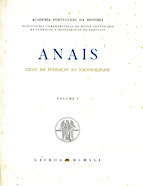

................................
Also addressing this period, Marcello Caetano (1953), Fernando Castelo Branco (1971), and Francisco José Caeiro (1973) sought to deepen their understanding of the era’s dynamics by using chronicles to interpret the broader impact of these events— Marcello Caetano’s work, in particular, adopts a more localised focus on Lisbon. These studies often refer to “social revolution” and “national revolution” to describe the sweeping changes Portuguese society was undergoing, demonstrating the use of some anachronistic terms in their narratives. For Francisco José Caeiro, there is a suggestion that the people united around a patriotic cause, calling for the salvation of the nation through the acclaim of a leader at this uncertain time, when independence was under threat. This movement was not a class struggle but rather a popular demand that became national as other social groups joined in, rejecting any foreign interference in internal affairs.
Regarding the origins of Portugal— a topic emphasised in 19th-century romantic historicism (Fernando Catroga, História da História em Portugal , 1996, 70-71) and perhaps also in these Anais — Mário Cardoso (1968) seeks to explain the ethnological origins of the Lusitanians in relation to nationality. Drawing on both ancient sources (Strabo) and modern ones (A. Schulten), he argues that the Lusitanians descended from pre-Indo-European peoples from North Africa or Celtic tribes from Gaul and Germania who later migrated to the Iberian Peninsula. Although he acknowledges the absence of a “notion of a common homeland,” Cardoso refers to the Lusitanians' spirit of socio-cultural unity as the “root, however distant, of today’s Portuguese.” This unity, he suggests, manifested in a sense of autonomy and cultural foundations that have endured, albeit transformed, through the centuries.
This work is financed by national funds through FCT - Foundation for Science and Technology, I.P, in the scope of the projects UIDB/04311/2020 and UIDP/04311/2020.
